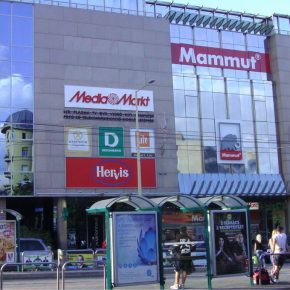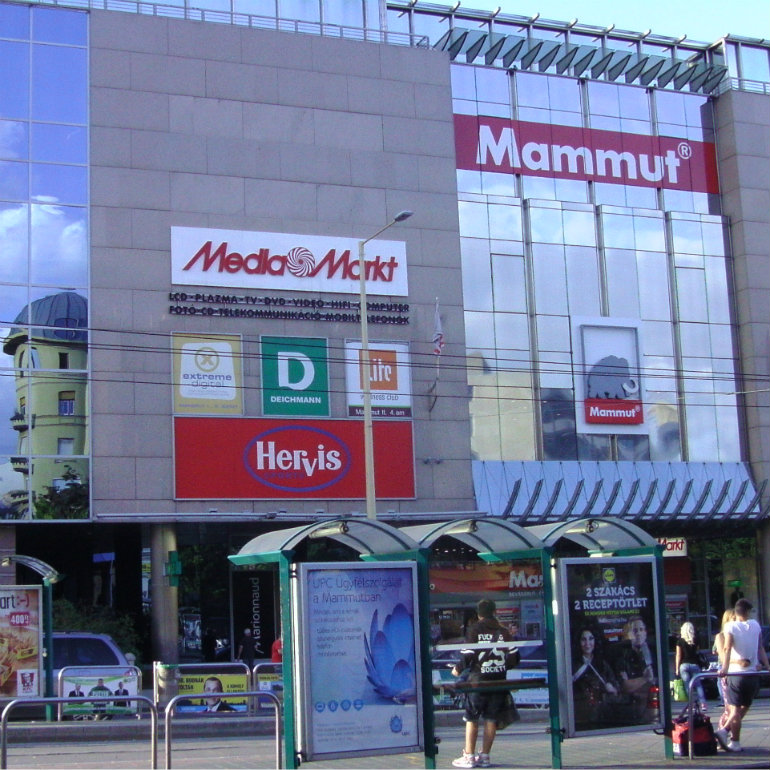
Mammut shopping center, Budapest, Hungary (Globetrotter19, CC BY-SA)
Hungary
Investors spent EUR1.54bn in 2016, beating the 2015 level of EUR745m, real estate services firm CBRE Hungary said. Both office and retail properties were the most sought after markets and CBRE is expecting similar or even higher turnover in 2017.
Growth in the office market was 129 per cent, with CBRE suggesting that demand for increasingly attractive second and third-class properties appeared on the market in addition to modern office buildings.
Investment turnover of retail properties increased by an even more significant 203 per cent, due in part to the change of ownership at the major Mammut shopping center, CBRE added.
The 44 per cent growth in the industrial property market fell short of the other sub-markets because of limited supply, with only a few industrial and logistics properties for sale in Hungary. The average transaction size fell and is now lower than it was before the crisis, CBRE noted.
The liquidity of the lower segment has significantly improved, which means that not only large properties are in demand, but local investment funds and individual investors are also showing a strong interest in properties valued at EUR50-60m.
Demand is lower for EUR60-100m properties; however, there is considerable demand for properties over EUR100m, especially from large international institutional investors. The supply is limited, as essentially there are only shopping centers in this bracket, according to CBRE.
„We are expecting strong turnover on the Hungarian commercial property market for 2017 as well,” said Lóránt Kibédi-Varga, Managing Director of CBRE Hungary. „Stable economic growth and increasing household consumption make the country attractive for investors, and moreover, all three credit rating agencies have graded Hungary suitable for investment thus more institutional investors may enter the market,” he added.
Kibédi-Varga noted that investment sales have quadrupled since 2013 in Hungary. „This extraordinary growth has also positively affected advisors; the market has grown by an annual 20 per cent in the last three years. CBRE has managed to grow in this period at a rate of 40 per cent per year, which was only possible through the trust and confidence of our customers and our strategic cooperation with them,” he said.
Tim O’Sullivan, Head of Capital Markets at CBRE, noted that besides the usual West European investors and Hungarian and American institutional funds, new players have also appeared on the market, such as Greek investors and investment companies from the United Arab Emirates. He added that German closed-end funds have also returned to Hungary, likewise playing a role in the turnover growth in 2016.
„German funds bought benchmark office buildings Park Atrium and Eiffel Palace in Budapest. In addition to the latter, the acquisition of Váci Corner was the third significant transaction on the Budapest office market last year,” O’Sullivan said.
„We can truly state that Hungary is back on the investment map.” O’Sullivan added that his team had a successful 2016, with involvement in some landmark deals, and the pipeline looks solid heading forward. „With new equity and solid fundamentals, I expect 2017 to be another record year for the Hungarian investment market,” he concluded.
Bulgaria
Trading in prime assets is expected to dominate the Bulgarian real estate market in 2017, Forton – a strategic partner of Cushman & Wakefield for Bulgaria and Macedonia – said.
„[…] If the expected transactions involving retail and office space are completed, the investment market can register its strongest year since 2007-2008,” Yavor Kostov, capital market manager at Forton, said in a statement. This is underpinned by Bulgaria’s good macroeconomic indicators and the availability of first-class investment products in the segments of office space and commercial space, Forton added.
Investment in the commercial real estate market – acquisitions of commercial real estate, office, industrial, retail, and purchases of land for such construction projects – rose to EUR290m in 2016, a rise of 16 per cent over 2015.
„Demand for office space for rent keeps its momentum from the previous year, mainly due to the IT and BPO sectors. What distinguishes the market now is the expected growth in supply in 2017, with 160,000 sq m of office space in Sofia planned for completion,” Stanimira Pashova, manager office spaces in Forton said in the statement.
In 2017, interest in locations outside of Sofia will increase, according to Forton. In addition to Plovdiv, Forton expects large deals in the office space segment to take place in Burgas and Varna.
In the industrial space market, Forton expects between 30,000 sq m and 40,000 sqm of additional space to be occupied for logistics purposes only in Sofia.
The market of retail space will remain well balanced as no significant additions were opened in Bulgaria last year. Prices of retail space are expected to slightly rise in 2017.
Romania
Romania recorded real estate deals of about EUR900m last year, up 35 per cent compared to 2015, according to data published by JLL. The number of deals was lower y/y but the average value of a transaction went up. Bucharest accounted for over 70 per cent of the total volume of the deals, less than in 2015. This shows that the liquidity in the secondary cities improved, reported local News.ro.
Demand from tenants is at record levels across all market segments. Also, the number of properties available for sale is growing and the yields in Romania are significantly higher than those in Poland and the Czech Republic.
The terms and conditions for financing have also considerably improved in Romania in the last year, getting closer to those of more mature countries in the region. “Consequently, sentiment is strong, with transactions of approximately EUR 630m in different stages of negotiation,” said Silviana Petre Badea, National Director, Head of Capital Markets JLL Romania.
The yields amount to 7.5 per cent for office projects, 7.25 per cent for prime retail, and 9 per cent for the industrial market. „There is downward pressure on yields and in 2017 significant compression in industrial and mild compression in offices and retail is likely,” Badea added.


